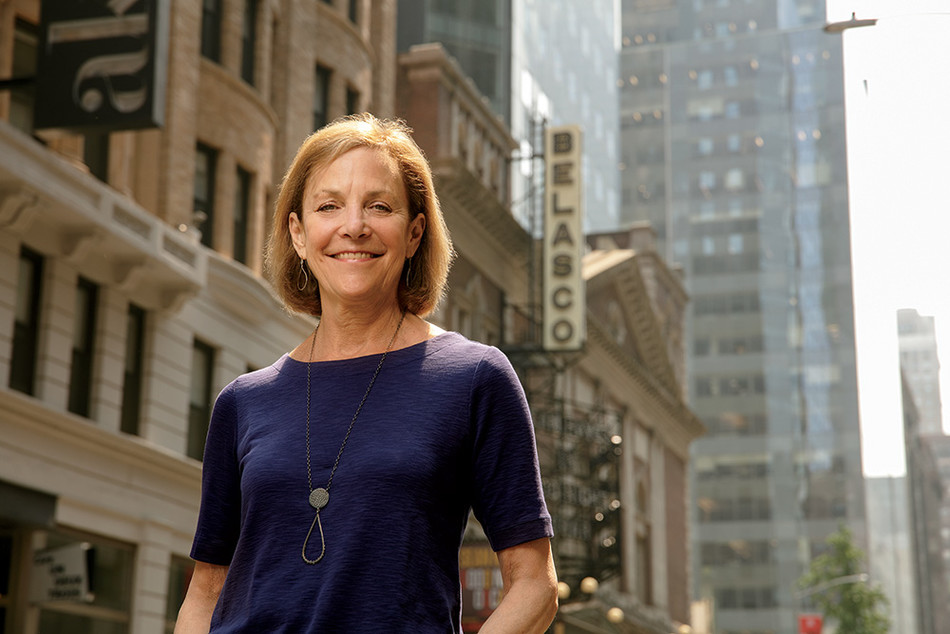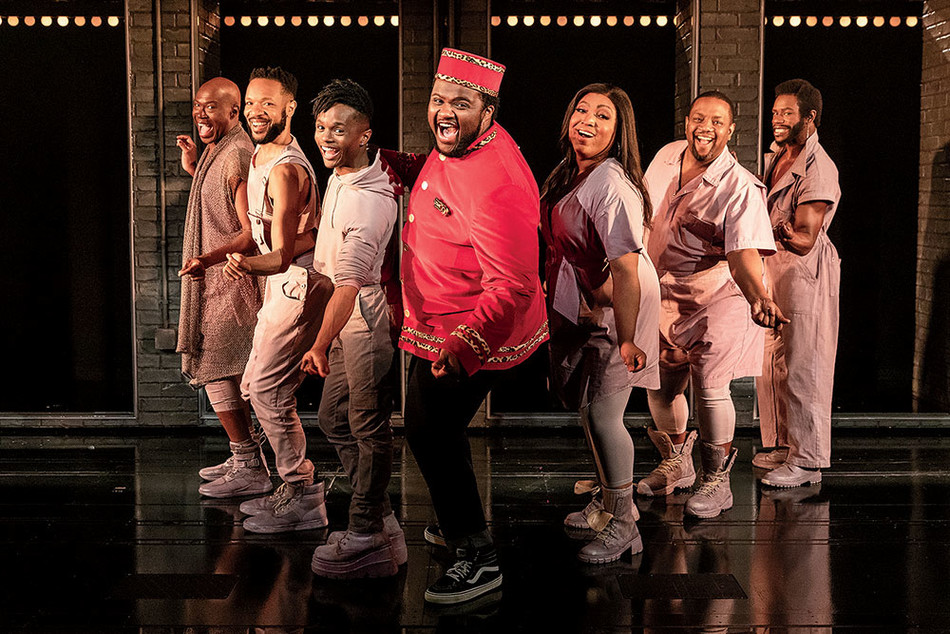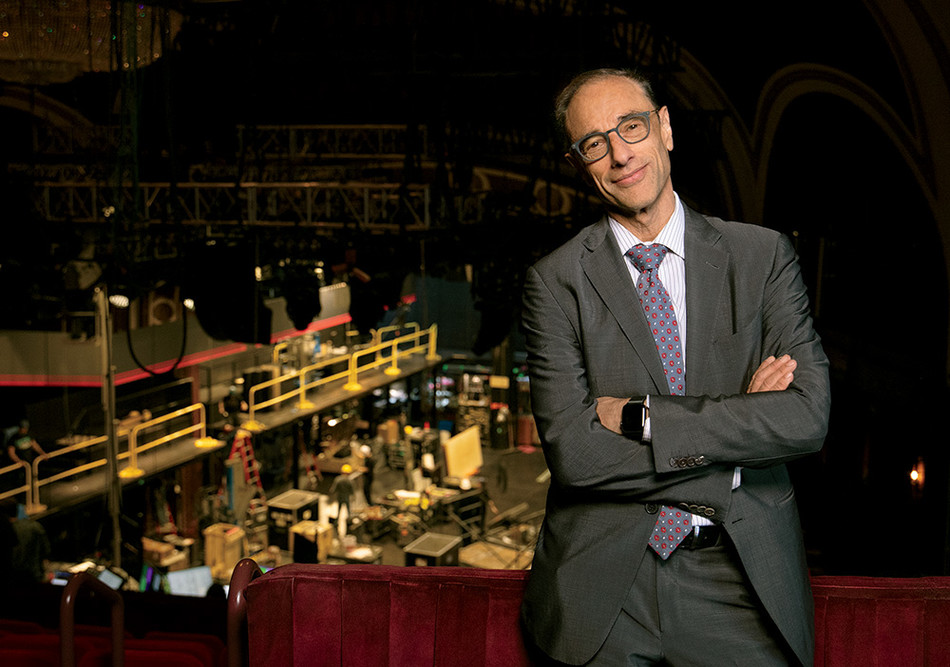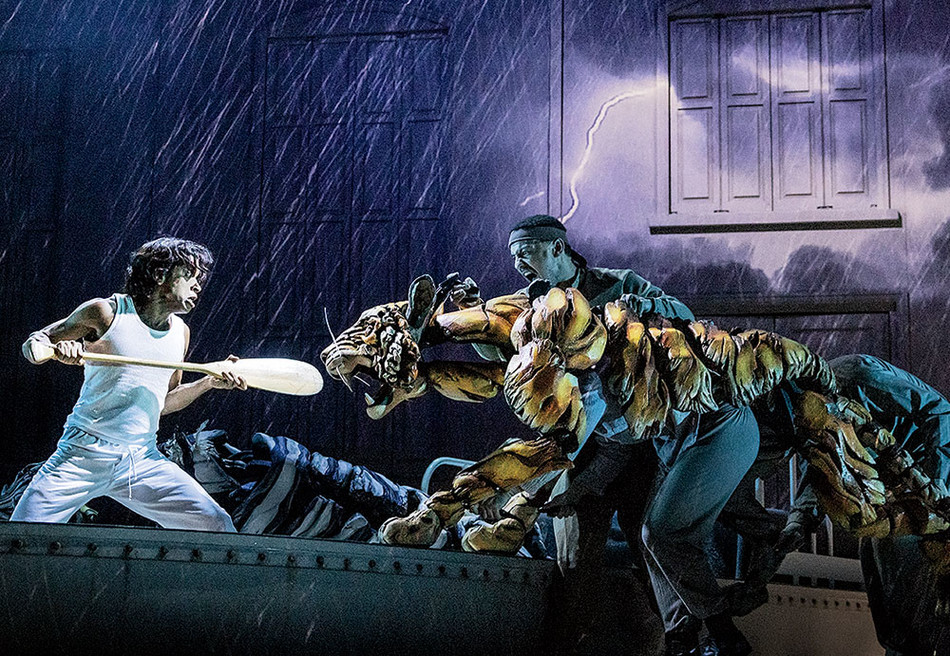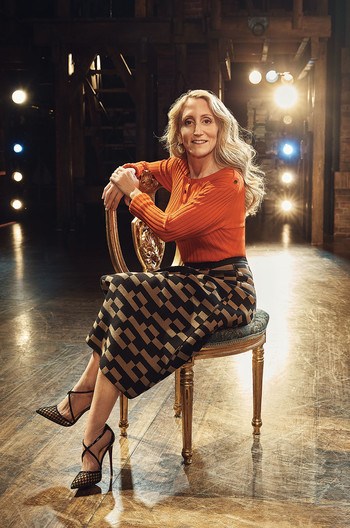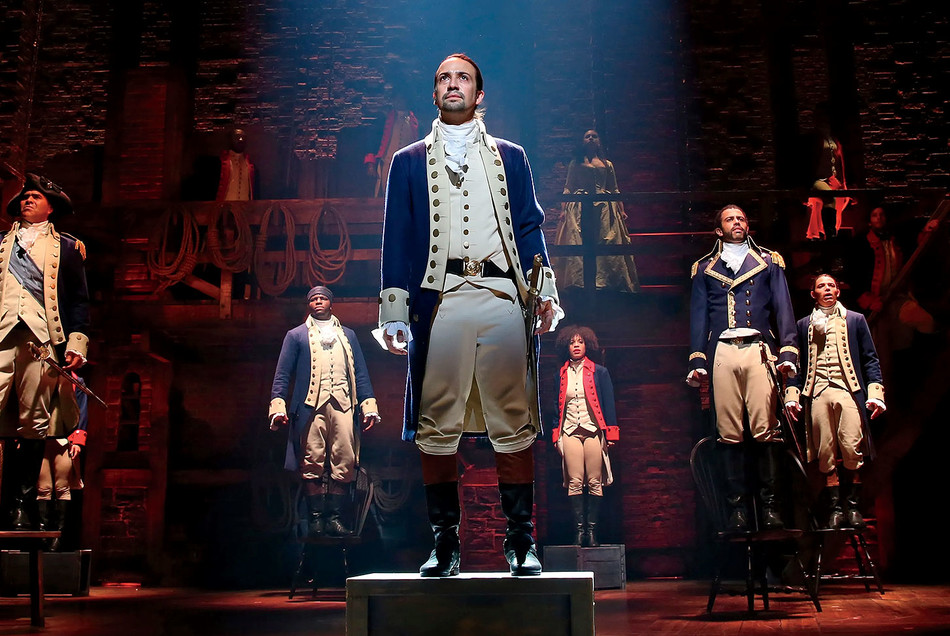Meet the Producers Behind Some of Broadway’s Biggest Hits
Barbara Whitman
Current production: Good Night, Oscar
Past productions include: A Strange Loop, Angels in America, Fun Home, Next to Normal, A Raisin in the Sun
“I think everyone working in theater has that one show,” says Tony Award–winning producer Barbara Whitman ’05SOA. “The one that made them think, ‘I can’t do anything else with my life.’”
For Whitman, the show was Pippin, the 1972 Broadway coming-of-age musical about a prince trying to figure out his purpose. As a teenager growing up in New York City, Whitman saw Pippin as often as she could, sneaking off to the theater after school and for weekend matinees. “It was surreal and over-the-top but also relatable,” says Whitman. “There was no intermission, so it really felt like you were whisked off, uninterrupted, to another world. And of course Bob Fosse’s choreography was pure magic.”
Eventually, Whitman became such a regular at the theater that she was given a part-time job in the coat check, which she says offered her a window into the complexities of a theatrical production. “When you see a live show once, it feels like that’s the only time it will ever be performed,” she says. “But of course it’s a business. That same show happens eight times every week. Seeing it day in and day out helped me understand what makes a production work.”
While Whitman would end up working behind the scenes, she started her theatrical career onstage. After dropping out of Bennington College (she would later earn a degree from NYU’s Gallatin School of Individualized Study), she toured as an actress with several national productions, including Annie. But Whitman knew that she wanted to have a family, which at that time felt incongruous with a career as a touring actress. She retired from the stage, married, and raised two sons. When her younger son was in kindergarten, Whitman decided to go back to work — this time in her father’s investment firm.
After working in finance for several years, Whitman realized that producing could be an ideal way to combine her two skill sets. “Production is kind of the crossroads of commerce and creativity,” she says. She quit her job and earned an MFA in theater management from Columbia’s School of the Arts, an experience she says was instrumental in shaping her career. “
You don’t need a degree to be a producer,” she says. “But I learned so much — everything from accounting and press management to how the seating is arranged at the Tony Awards. And the Columbia faculty are all people who have been in the business for years. They became my initial professional network.”
During Whitman’s second year in the program, she produced her first Broadway show, a revival of A Raisin in the Sun, starring Sean Combs. When she graduated the following year, in 2005, she had two shows on Broadway: The 25th Annual Putnam County Spelling Bee and Dirty Rotten Scoundrels. She went on to produce some of the biggest hits of the 2000s and 2010s: Fun Home, Next to Normal, and If/Then, to name just a few. In 2016, she saw a reading of a new musical by Michael R. Jackson about what it feels like “to travel the world in a fat, Black, queer body.” The show — A Strange Loop — was unconventional, and Whitman never imagined that it would make it to Broadway. But, she says, “it felt like an important story to tell, especially for that time.” The show won the Pulitzer Prize in 2020. Two years later, it opened on the Great White Way.
"There has to be something unique about the live experience that can’t be replicated on film or television."
As she has built her career, Whitman has looked for ways to give back. She established a scholarship in the theater management and producing program at Columbia’s School of the Arts a decade ago, and in 2021 she endowed the Barbara Whitman Award, a $10,000 annual unrestricted gift given to a mid-career woman, trans, or nonbinary theater director, administered by the Stage Directors and Choreographers Foundation. “During the pandemic, we all had a little more time to think about the future of the industry,” she says. “This is a small way for me to support the new talent that will be ushering it in.”
But Whitman is hardly ready to hang up her hat. She recently produced the London debut of A Strange Loop, as well as Good Night, Oscar, a new play starring actor and comedian Sean Hayes. She’s also developing a musical with two young Scottish composers centered on the idea of the ceilidh — a traditional community dance.
Whitman says that she looks for three things when she’s deciding whether to produce a show. First, of course, it has to be marketable. She knows that a marquee name like Hayes, for example, will bring in audiences. There has to be something unique about the live experience that can’t be replicated on film or television — in Ceilidh, the audience will actually learn the dance. But most of all, she says, there has to be a human connection.
“For all the razzle-dazzle of Pippin, I think I just saw something in the character,” she says. “And that made me want to keep coming back.”
Hal Luftig
Current productions: Here Lies Love, Life of Pi
Past productions include: Children of a Lesser God, Kinky Boots, West Side Story, Legally Blonde, Thoroughly Modern Millie
When Hal Luftig ’84SOA was five years old, his parents took him to his first Broadway show, driving into the city from their home on Long Island to see Luther Adler in Fiddler on the Roof. Luftig remembers his mother telling him on the way to the theater that he would have to sit still and be quiet during the show. But she needn’t have worried: from the moment the curtain rose, Luftig was spellbound.
“It was at the Imperial Theatre. The second-to-last row in the rear mezzanine. I can tell you exactly how many seats over from the aisle,” he says. “Whenever I’m there, I sneak over to that seat for a minute and think, Wow. I can’t believe I’m a part of all of this.”
Luftig is now a four-time Tony Award–winning producer, with a storied career that includes hits like Thoroughly Modern Millie, Legally Blonde, and Kinky Boots. He says producing is all he’s ever wanted to do.
“I was never going to be a performer. Trust me, you don’t want to hear me sing,” he says. “But I figured out pretty quickly that there were a lot of parts to making a musical happen. There were costumes and sets and lights and people down in the pit. I knew instinctively that someone had to pull all of that together.”
Luftig’s parents were supportive of his burgeoning “theater obsession” until it came time for him to apply to college. “They wanted me to get a real degree,” he says. He went to SUNY Oneonta, where he studied psychology and journalism, and then came back to Long Island and got a reporting job at Newsday.
“I was miserable,” he says. “But I didn’t know how to break into the theater business.”
At the time, the American Theatre Wing, the nonprofit organization that created the Tony Awards, sponsored public seminars called Working in the Theatre four times a year. Luftig would call in sick to work and attend every one. After a while, the president of the American Theatre Wing, Isabelle Stevenson, approached him and encouraged him to apply to Columbia’s newly formed MFA program in theater management. Luftig submitted an application and was called in to interview with Schuyler Chapin, a legendary arts administrator then serving as the dean of the School of the Arts.
“The lights, the sets, the smell when you walk in the door — it’s intoxicating.”
“He looked at my résumé with no theater experience whatsoever and said, ‘Why should I admit you?’” Luftig recalls. “And I just said, ‘No one wants this more than I do, and no one will work harder.’”
Luftig got in, and that mantra guided him not only during the program but also after he graduated, through internships in just about every backstage job he could find. “I made coffee, I found props,” he says. “If they needed pantyhose in a certain color, I made that my life’s purpose. I was just so thrilled to be there.”
That experience led to several associate-producing jobs both off and on Broadway, and in 2000, Luftig got the opportunity to be lead producer for the first time, for the musical Thoroughly Modern Millie. Based on the 1967 film of the same name, it first opened at the La Jolla Playhouse in San Diego and moved to Broadway two years later. While the show was largely a critical success, an early pan from the New York Times made Luftig realize that producing was about more than just finding investors.
“I realized that the producer really is the emotional support for the whole company: you have to be therapist, cheerleader, muse, and friend,” Luftig says. “After we got that bad review in the Times, I had to go to the company and tell them that I believed in them. I believed we had a hit. We went on to win six Tony Awards, including best musical.”
More hits followed, from revivals of classic Broadway shows like West Side Story and Children of a Lesser God to original musicals like Legally Blonde and the megahit Kinky Boots. Luftig says he is particularly fond of stories with a strong message, even if wrapped in a fun package. “Legally Blonde seems like cotton candy, pure silly fun,” he says. “But there’s something important at the core: women should never feel like they need to dumb themselves down.”
Luftig has two shows currently on Broadway: Life of Pi, based on the best-selling novel about a boy stranded on a boat with a 450-pound Bengal tiger, and Here Lies Love, a musical extravaganza by David Byrne and Fatboy Slim about the rise and fall of former first lady of the Philippines Imelda Marcos. Luftig says that he feels particularly emotional about the opening of Here Lies Love, which he has been trying for a decade to bring to Broadway. The show first opened Off Broadway, at the Public Theater in Lower Manhattan, in 2013, but a variety of delays — including the COVID-19 pandemic — prevented it from moving uptown. In the meantime, the political situation in the Philippines changed: the Marcos family returned to power when Imelda’s son assumed the presidency in 2022.
“So what started out as this wild fun disco-pop musical in 2013 now means something different,” Luftig says. “We wanted to make sure that Filipino voices were involved on every level — from the cast to the costume designers.”
Luftig says that after all these years, he still finds theater thrilling: “The lights, the sets, the smell when you walk in the door — it’s intoxicating.” The best part of his job, he says, is working with so many brilliant creative minds.
“These are people that spend their whole lives creating something beautiful,” he says. “And I’m the one that gets to make their dreams come true.”
Jill Furman
Upcoming production: Wonder, Suffs
Past productions include: Freestyle Love Supreme, Hamilton, Rodgers & Hammerstein’s Cinderella, In the Heights, The Drowsy Chaperone
In 2003, Jill Furman ’97BUS was in the early stages of a film-production career when a friend invited her to the basement of a Midtown bookstore, where a young hip-hop artist was performing a piece from a musical he was writing about his neighborhood.
“It was described to me as a Latino version of Rent,” Furman says. “But immediately I knew that this was something different. He had this infectious charm, this monumentally new way of telling a story. There was something about him that made me sit up and take notice.”
That young artist was Lin-Manuel Miranda. The piece was a very early version of In the Heights. And the performance was enough to change the trajectory of Furman’s career.
Furman was no stranger to the theater. She grew up in New York City in an “arts-obsessed family,” seeing everything that came to Broadway. “A Chorus Line and Grease were particular favorites,” she says. “I could probably still sing you every line from both.” As an undergraduate at Brown, Furman studied art history, though an internship at a gallery made it clear that becoming a curator was not the right path for her. So after leaving college, she got a job with the talent agency ICM, and later she moved to Los Angeles to work in film development, reading scripts and providing critiques.
“I wanted to start my own production company,” Furman says. “But I’d always been very right-brained. I was scared of numbers.”
Furman decided that the best way to bolster her business acumen was to go back to school, and she enrolled at Columbia. “An MBA isn’t the most direct path to a career in production,” Furman says. “But I learned about marketing, about fundraising, about how to read a spreadsheet. Columbia gave me the skills and confidence I needed when I started talking to investors.”
Furman’s father, Roy, an investment banker with a specialty in media and entertainment, had begun to dabble in theater production as well (he would go on to a very successful second career, with Tony Award–winning hits like Spamalot and The Book of Mormon). When Furman graduated from Columbia, she started working with him, serving as an associate producer on his first two shows.
“That was how I dipped my toe into the water. But I was still pretty focused on film. I definitely didn’t know that I wanted to be in theater, or stay in theater,” she says. “Until I met Lin.”
Furman says she was compelled to work with Miranda from that very first reading in 2003. “I had never heard anything like that onstage,” she says. “I knew that I needed to be involved in it, to be in this person’s life.” It would take five years for In the Heights to reach Broadway. And while Miranda was completing the musical — he taught high school and worked as a bar mitzvah dancer to make ends meet — Furman built up her theater bona fides. In 2006, she produced the Broadway debut of The Drowsy Chaperone — a parody of 1920s musical comedy — which went on to win five Tony Awards that year.
She followed it up with In the Heights, which won best musical in 2008 and cemented in Furman’s mind that Miranda was a genius with limitless potential. Still, she was awestruck when, in 2012 at Lincoln Center, she saw him perform a selection of songs from a hip-hop concept album he was working on about Founding Father Alexander Hamilton 1788HON.
“People were absolutely losing their minds,” Furman says. “And I was one of them. It just blew me away.”
Furman began working with Miranda on Hamilton immediately, even as her home life grew busier. In December 2014, she became the single mother of a baby boy. Just weeks later, Hamilton opened in previews at the Public Theater. “I like to say that those were the two greatest productions of my life,” she says. A year later, Hamilton moved to Broadway, sweeping the Tony Awards and becoming a cultural juggernaut.
“I think I knew right away that it somehow spoke to everyone in the room, no matter what room we were in.”
Furman says that Hamilton wasn’t a hard sell — “Investors were just throwing money at us” — but she was still unprepared for the phenomenon it would become. “I think I knew right away that it somehow spoke to everyone in the room, no matter what room we were in,” she says. “But it became a part of the cultural conversation. It transcended the theater. I honestly don’t think we’ll ever see anything like it again.”
Furman continues to look for shows that tell important stories in unique ways. She’s currently working on bringing the historical musical Suffs, about the US women’s suffrage movement, to Broadway after a successful run at the Public. And she is developing a musical based on the best-selling young-adult book Wonder, about a boy with a facial difference looking to make friends.
“I’m notoriously picky,” Furman says. “I say no to almost everything. But when I believe in something, I put my whole self behind it.”
This article appears in the Fall 2023 print edition of Columbia Magazine with the title "The Producers."
